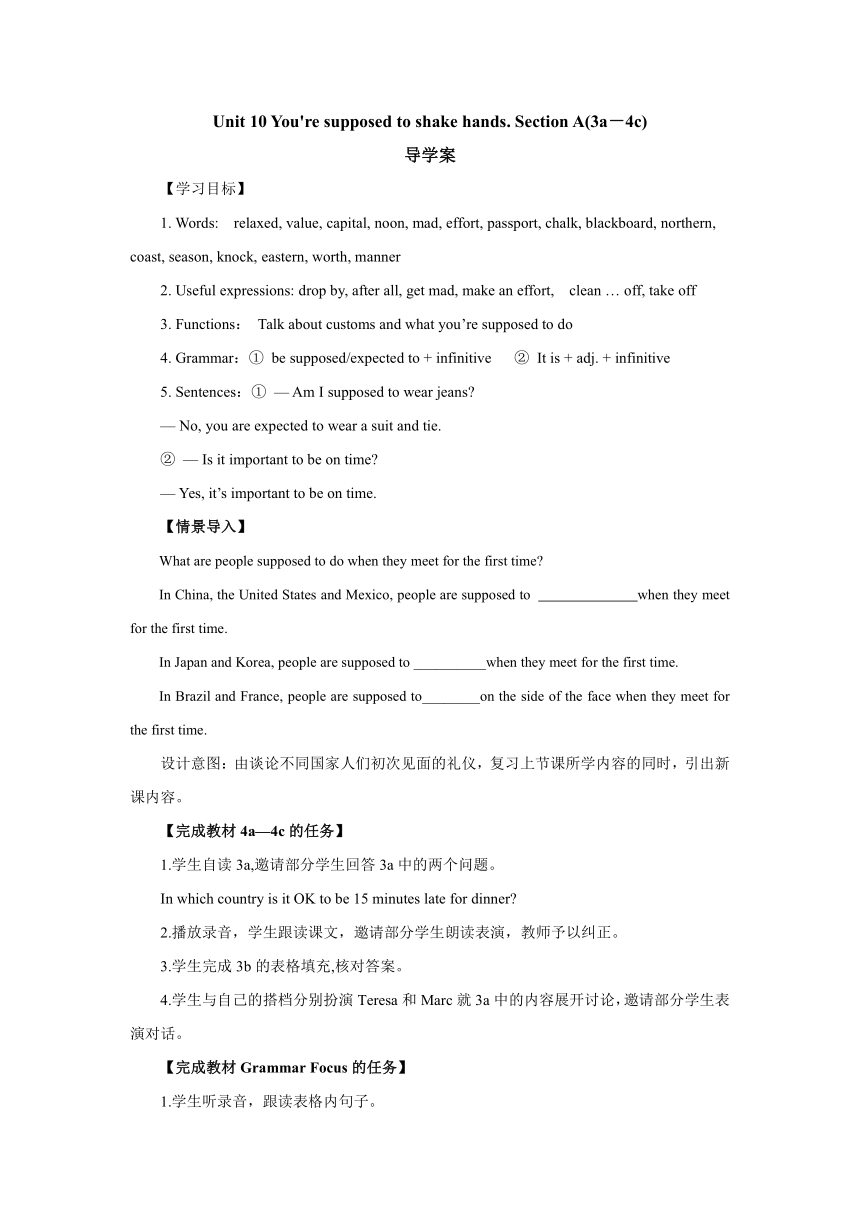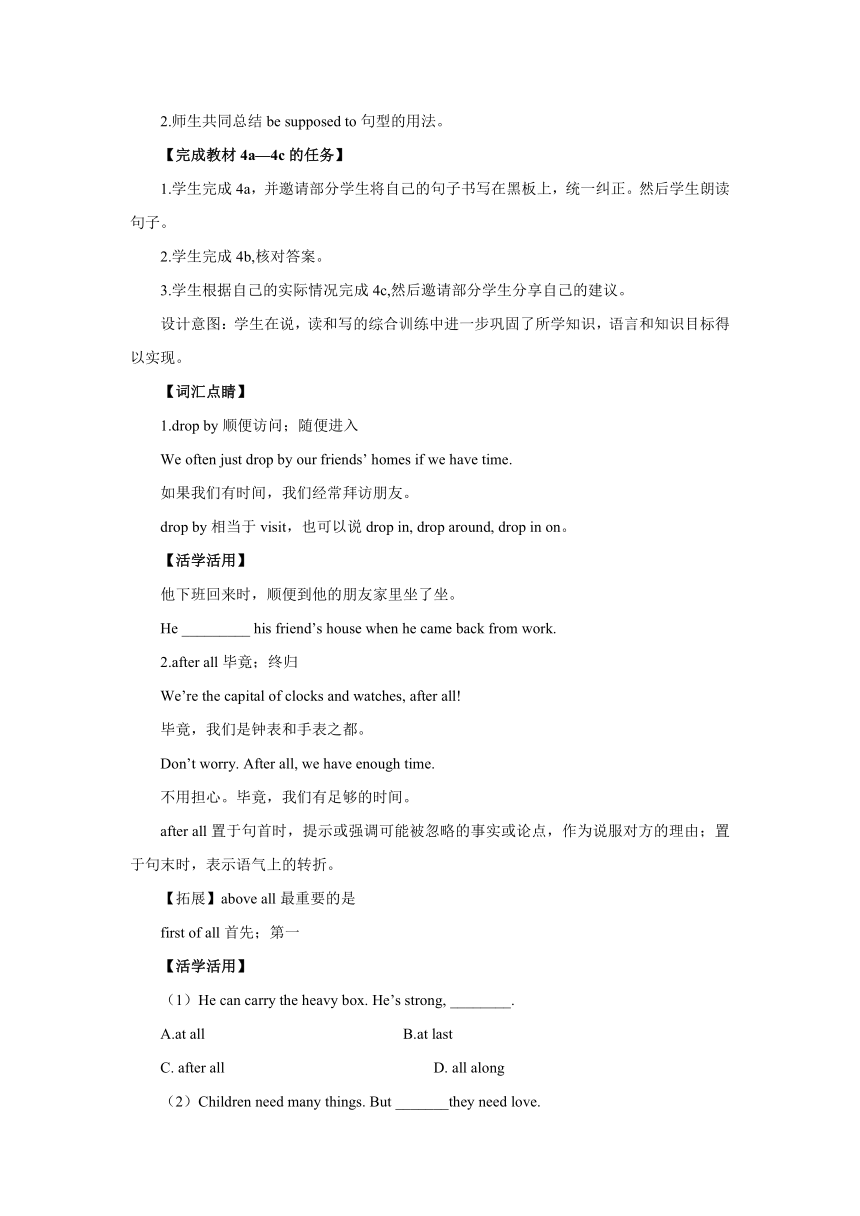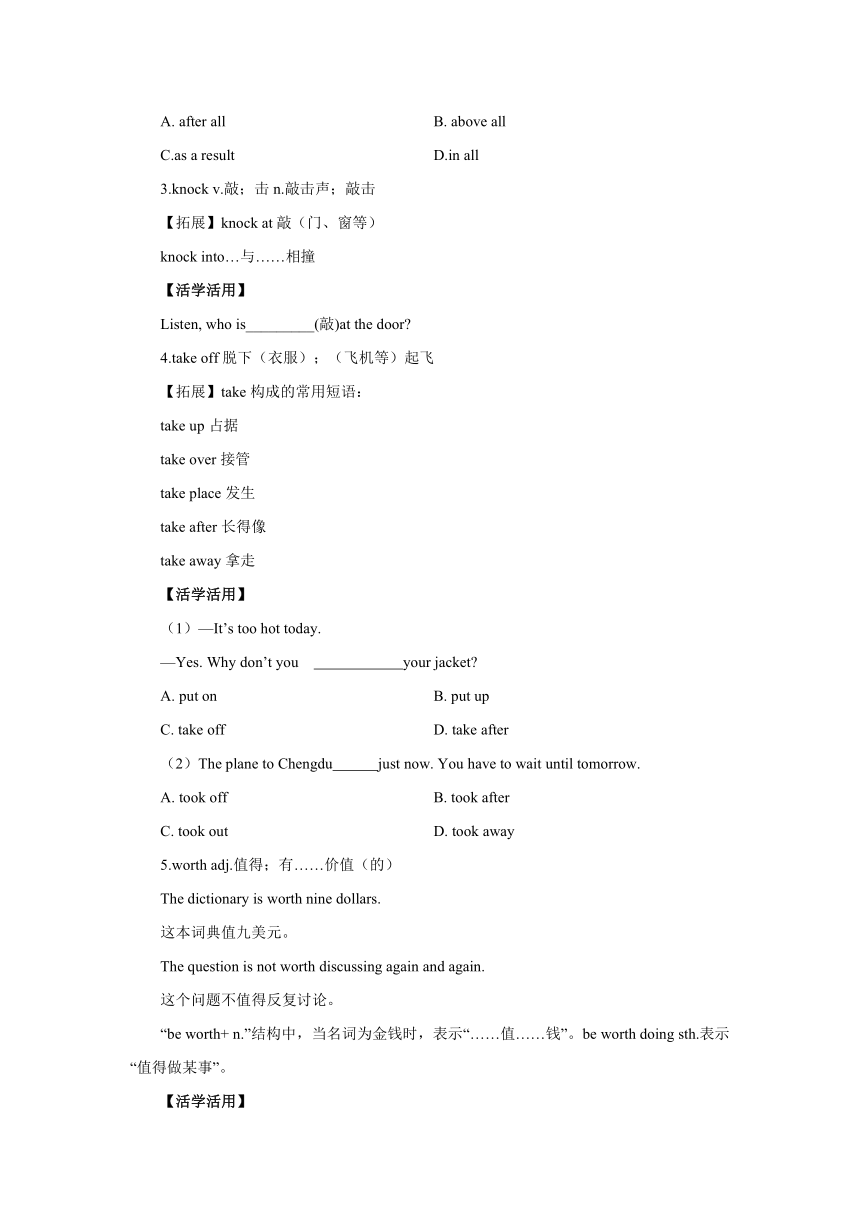人教版九年级全册 Unit 10 You're supposed to shake hands Section A(3a-4c)导学案
文档属性
| 名称 | 人教版九年级全册 Unit 10 You're supposed to shake hands Section A(3a-4c)导学案 |

|
|
| 格式 | docx | ||
| 文件大小 | 70.0KB | ||
| 资源类型 | 教案 | ||
| 版本资源 | 人教新目标(Go for it)版 | ||
| 科目 | 英语 | ||
| 更新时间 | 2022-11-19 14:56:54 | ||
图片预览



文档简介
Unit 10 You're supposed to shake hands. Section A(3a-4c)
导学案
【学习目标】
1. Words: relaxed, value, capital, noon, mad, effort, passport, chalk, blackboard, northern, coast, season, knock, eastern, worth, manner
2. Useful expressions: drop by, after all, get mad, make an effort, clean … off, take off
3. Functions: Talk about customs and what you’re supposed to do
4. Grammar:① be supposed/expected to + infinitive ② It is + adj. + infinitive
5. Sentences:① — Am I supposed to wear jeans
— No, you are expected to wear a suit and tie.
② — Is it important to be on time
— Yes, it’s important to be on time.
【情景导入】
What are people supposed to do when they meet for the first time
In China, the United States and Mexico, people are supposed to when they meet for the first time.
In Japan and Korea, people are supposed to __________when they meet for the first time.
In Brazil and France, people are supposed to________on the side of the face when they meet for the first time.
设计意图:由谈论不同国家人们初次见面的礼仪,复习上节课所学内容的同时,引出新课内容。
【完成教材4a—4c的任务】
1.学生自读3a,邀请部分学生回答3a中的两个问题。
In which country is it OK to be 15 minutes late for dinner
2.播放录音,学生跟读课文,邀请部分学生朗读表演,教师予以纠正。
3.学生完成3b的表格填充,核对答案。
4.学生与自己的搭档分别扮演Teresa和Marc就3a中的内容展开讨论,邀请部分学生表演对话。
【完成教材Grammar Focus的任务】
1.学生听录音,跟读表格内句子。
2.师生共同总结be supposed to句型的用法。
【完成教材4a—4c的任务】
1.学生完成4a,并邀请部分学生将自己的句子书写在黑板上,统一纠正。然后学生朗读句子。
2.学生完成4b,核对答案。
3.学生根据自己的实际情况完成4c,然后邀请部分学生分享自己的建议。
设计意图:学生在说,读和写的综合训练中进一步巩固了所学知识,语言和知识目标得以实现。
【词汇点睛】
1.drop by顺便访问;随便进入
We often just drop by our friends’ homes if we have time.
如果我们有时间,我们经常拜访朋友。
drop by相当于visit,也可以说drop in, drop around, drop in on。
【活学活用】
他下班回来时,顺便到他的朋友家里坐了坐。
He _________ his friend’s house when he came back from work.
2.after all毕竟;终归
We’re the capital of clocks and watches, after all!
毕竟,我们是钟表和手表之都。
Don’t worry. After all, we have enough time.
不用担心。毕竟,我们有足够的时间。
after all置于句首时,提示或强调可能被忽略的事实或论点,作为说服对方的理由;置于句末时,表示语气上的转折。
【拓展】above all最重要的是
first of all首先;第一
【活学活用】
(1)He can carry the heavy box. He’s strong, ________.
A.at all B.at last
C. after all D. all along
(2)Children need many things. But _______they need love.
A. after all B. above all
C.as a result D.in all
3.knock v.敲;击n.敲击声;敲击
【拓展】knock at敲(门、窗等)
knock into…与……相撞
【活学活用】
Listen, who is_________(敲)at the door
4.take off脱下(衣服);(飞机等)起飞
【拓展】take构成的常用短语:
take up占据
take over接管
take place发生
take after长得像
take away拿走
【活学活用】
(1)—It’s too hot today.
—Yes. Why don’t you your jacket
A. put on B. put up
C. take off D. take after
(2)The plane to Chengdu just now. You have to wait until tomorrow.
A. took off B. took after
C. took out D. took away
5.worth adj.值得;有……价值(的)
The dictionary is worth nine dollars.
这本词典值九美元。
The question is not worth discussing again and again.
这个问题不值得反复讨论。
“be worth+ n.”结构中,当名词为金钱时,表示“……值……钱”。be worth doing sth.表示“值得做某事”。
【活学活用】
Our teacher has given us some advice that is well worth ___________(consider).
6.manner n.方式;方法(pl.)礼貌;礼仪
He smiled again in a friendly manner.
他又友好地微笑了一下。
Could you give me some advice about table manners in France
你可以给我一些关于法国的餐桌礼仪的建议吗?
manner作“礼貌”讲时,常用复数形式。good manners意为“有礼貌”;bad manners意为“不礼貌”。
【活学活用】
(1)嘲笑别人是不礼貌的。
It’s bad __________ to laugh at others.
(2)你可以用这种方式来做。
You can do it in this __________.
【句型透视】
1.We don’t usually have to make plans to meet our friends.
我们通常不必刻意安排与朋友的见面。
make plans to do sth.表示“计划做某事”,plan作名词;该短语相当于plan to do sth.,此时,plan作动词。
They made a plan to go swimming this afternoon.=They planned to go swimming this afternoon.他们计划今天下午去游泳。
【活学活用】
1.用括号中所给词的适当形式填空。
Helen made a plan _________ (visit) the Great Wall this Sunday.
2.改为同义句。
We have made a plan to go camping this summer vacation.
We have______________ to go camping this summer vacation.
2.I always leave the house early to avoid heavy traffic because I think it’s impolite to keep others waiting.
为了避免拥挤的交通,我总是早离开家,因为我认为让别人等着是不礼貌的。
(1)句中because引导的是原因状语从句,“it’s impolite to keep others waiting”是“It is+adj.+to do sth.”结构,it作形式主语,动词不定式作真正的主语。如:
It’s very important for us to learn English well.
对我们来说,学好英语很重要。
(2)keep…doing sth.表示“让……保持做某事”。如:
I’m sorry to let you keep waiting for us so long.
很抱歉让你等我们这么长时间。
【活学活用】
1.单项选择。
It is polite a gift when you visit somebody for the first time.
A. take B. taking
C. to take D. took
2.根据汉语意思完成句子。
开会时他一直站着。
He _______________ during the meeting.
【语法摘要】
be supposed to 意为“应该……”,相当于 should;be expected to意为“应该……;被期望……”。两者都用来表示根据规定或传统习惯应该做某事或期待某事发生,两者中的to为不定式符号,后接动词原形。
be supposed to 的用法
1. 当主语是人时
be supposed to的主语是人时,意为“应该……”,用来表示劝告、建议、责任等。
We’re supposed to spread positive energy everywhere we go.
You are not supposed to enter the teachers’ office unless you are allowed to.
2. 当主语是事或物时
be supposed to的主语是事或物时,意为“本该,本应”,用于表示某事本应该发生而没有发生。
The meeting was supposed to take place on Tuesday, but we’ve had to put it off.
3. be supposed to do sth.的否定形式
be supposed to do sth.的否定形式为be not supposed to do sth. ,意为“不应该做某事”,表示命令或禁止。
You’re not supposed to talk loudly in class.
【拓展延伸】
(1) be supposed to have done表示“本应该做某事(实际上没做)”,相当于should have done。
He was supposed to have arrived an hour ago.
(2) be supposed to还可表示“被认为……;被相信……”。
The dolphins are supposed to be very clever.
be expected to 的用法
be expected to do sth. 意为“应该做某事”或“被期望做某事”,其表达的主观性比be supposed to do sth. 更强。
You’re expected to clean the house.
It is + adj. + to do sth. 的用法
It is + adj. + to do sth. 意为“做某事是……的”,其中It为形式主语,真正的主语是动词不定式(短语)。
It is hard to solve this problem.
【拓展延伸】在该结构中,有时在to do sth.前加上for/of sb.,表示动词不定式(短语)的逻辑主语。其用法如下:
导学案
【学习目标】
1. Words: relaxed, value, capital, noon, mad, effort, passport, chalk, blackboard, northern, coast, season, knock, eastern, worth, manner
2. Useful expressions: drop by, after all, get mad, make an effort, clean … off, take off
3. Functions: Talk about customs and what you’re supposed to do
4. Grammar:① be supposed/expected to + infinitive ② It is + adj. + infinitive
5. Sentences:① — Am I supposed to wear jeans
— No, you are expected to wear a suit and tie.
② — Is it important to be on time
— Yes, it’s important to be on time.
【情景导入】
What are people supposed to do when they meet for the first time
In China, the United States and Mexico, people are supposed to when they meet for the first time.
In Japan and Korea, people are supposed to __________when they meet for the first time.
In Brazil and France, people are supposed to________on the side of the face when they meet for the first time.
设计意图:由谈论不同国家人们初次见面的礼仪,复习上节课所学内容的同时,引出新课内容。
【完成教材4a—4c的任务】
1.学生自读3a,邀请部分学生回答3a中的两个问题。
In which country is it OK to be 15 minutes late for dinner
2.播放录音,学生跟读课文,邀请部分学生朗读表演,教师予以纠正。
3.学生完成3b的表格填充,核对答案。
4.学生与自己的搭档分别扮演Teresa和Marc就3a中的内容展开讨论,邀请部分学生表演对话。
【完成教材Grammar Focus的任务】
1.学生听录音,跟读表格内句子。
2.师生共同总结be supposed to句型的用法。
【完成教材4a—4c的任务】
1.学生完成4a,并邀请部分学生将自己的句子书写在黑板上,统一纠正。然后学生朗读句子。
2.学生完成4b,核对答案。
3.学生根据自己的实际情况完成4c,然后邀请部分学生分享自己的建议。
设计意图:学生在说,读和写的综合训练中进一步巩固了所学知识,语言和知识目标得以实现。
【词汇点睛】
1.drop by顺便访问;随便进入
We often just drop by our friends’ homes if we have time.
如果我们有时间,我们经常拜访朋友。
drop by相当于visit,也可以说drop in, drop around, drop in on。
【活学活用】
他下班回来时,顺便到他的朋友家里坐了坐。
He _________ his friend’s house when he came back from work.
2.after all毕竟;终归
We’re the capital of clocks and watches, after all!
毕竟,我们是钟表和手表之都。
Don’t worry. After all, we have enough time.
不用担心。毕竟,我们有足够的时间。
after all置于句首时,提示或强调可能被忽略的事实或论点,作为说服对方的理由;置于句末时,表示语气上的转折。
【拓展】above all最重要的是
first of all首先;第一
【活学活用】
(1)He can carry the heavy box. He’s strong, ________.
A.at all B.at last
C. after all D. all along
(2)Children need many things. But _______they need love.
A. after all B. above all
C.as a result D.in all
3.knock v.敲;击n.敲击声;敲击
【拓展】knock at敲(门、窗等)
knock into…与……相撞
【活学活用】
Listen, who is_________(敲)at the door
4.take off脱下(衣服);(飞机等)起飞
【拓展】take构成的常用短语:
take up占据
take over接管
take place发生
take after长得像
take away拿走
【活学活用】
(1)—It’s too hot today.
—Yes. Why don’t you your jacket
A. put on B. put up
C. take off D. take after
(2)The plane to Chengdu just now. You have to wait until tomorrow.
A. took off B. took after
C. took out D. took away
5.worth adj.值得;有……价值(的)
The dictionary is worth nine dollars.
这本词典值九美元。
The question is not worth discussing again and again.
这个问题不值得反复讨论。
“be worth+ n.”结构中,当名词为金钱时,表示“……值……钱”。be worth doing sth.表示“值得做某事”。
【活学活用】
Our teacher has given us some advice that is well worth ___________(consider).
6.manner n.方式;方法(pl.)礼貌;礼仪
He smiled again in a friendly manner.
他又友好地微笑了一下。
Could you give me some advice about table manners in France
你可以给我一些关于法国的餐桌礼仪的建议吗?
manner作“礼貌”讲时,常用复数形式。good manners意为“有礼貌”;bad manners意为“不礼貌”。
【活学活用】
(1)嘲笑别人是不礼貌的。
It’s bad __________ to laugh at others.
(2)你可以用这种方式来做。
You can do it in this __________.
【句型透视】
1.We don’t usually have to make plans to meet our friends.
我们通常不必刻意安排与朋友的见面。
make plans to do sth.表示“计划做某事”,plan作名词;该短语相当于plan to do sth.,此时,plan作动词。
They made a plan to go swimming this afternoon.=They planned to go swimming this afternoon.他们计划今天下午去游泳。
【活学活用】
1.用括号中所给词的适当形式填空。
Helen made a plan _________ (visit) the Great Wall this Sunday.
2.改为同义句。
We have made a plan to go camping this summer vacation.
We have______________ to go camping this summer vacation.
2.I always leave the house early to avoid heavy traffic because I think it’s impolite to keep others waiting.
为了避免拥挤的交通,我总是早离开家,因为我认为让别人等着是不礼貌的。
(1)句中because引导的是原因状语从句,“it’s impolite to keep others waiting”是“It is+adj.+to do sth.”结构,it作形式主语,动词不定式作真正的主语。如:
It’s very important for us to learn English well.
对我们来说,学好英语很重要。
(2)keep…doing sth.表示“让……保持做某事”。如:
I’m sorry to let you keep waiting for us so long.
很抱歉让你等我们这么长时间。
【活学活用】
1.单项选择。
It is polite a gift when you visit somebody for the first time.
A. take B. taking
C. to take D. took
2.根据汉语意思完成句子。
开会时他一直站着。
He _______________ during the meeting.
【语法摘要】
be supposed to 意为“应该……”,相当于 should;be expected to意为“应该……;被期望……”。两者都用来表示根据规定或传统习惯应该做某事或期待某事发生,两者中的to为不定式符号,后接动词原形。
be supposed to 的用法
1. 当主语是人时
be supposed to的主语是人时,意为“应该……”,用来表示劝告、建议、责任等。
We’re supposed to spread positive energy everywhere we go.
You are not supposed to enter the teachers’ office unless you are allowed to.
2. 当主语是事或物时
be supposed to的主语是事或物时,意为“本该,本应”,用于表示某事本应该发生而没有发生。
The meeting was supposed to take place on Tuesday, but we’ve had to put it off.
3. be supposed to do sth.的否定形式
be supposed to do sth.的否定形式为be not supposed to do sth. ,意为“不应该做某事”,表示命令或禁止。
You’re not supposed to talk loudly in class.
【拓展延伸】
(1) be supposed to have done表示“本应该做某事(实际上没做)”,相当于should have done。
He was supposed to have arrived an hour ago.
(2) be supposed to还可表示“被认为……;被相信……”。
The dolphins are supposed to be very clever.
be expected to 的用法
be expected to do sth. 意为“应该做某事”或“被期望做某事”,其表达的主观性比be supposed to do sth. 更强。
You’re expected to clean the house.
It is + adj. + to do sth. 的用法
It is + adj. + to do sth. 意为“做某事是……的”,其中It为形式主语,真正的主语是动词不定式(短语)。
It is hard to solve this problem.
【拓展延伸】在该结构中,有时在to do sth.前加上for/of sb.,表示动词不定式(短语)的逻辑主语。其用法如下:
同课章节目录
- Unit 1 How can we become good learners.
- Section A
- Section B
- Unit 2 I think that mooncakes are delicious!
- Section A
- Section B
- Unit 3 Could you please tell me where the restroom
- Section A
- Section B
- Unit 4 I used to be afraid of the dark.
- Section A
- Section B
- Unit 5 What are the shirts made of?
- Section A
- Section B
- Review of Units 1-5
- Unit 6 When was it invented?
- Section A
- Section B
- Unit 7 Teenagers should be allowed to choose their
- Section A
- Section B
- Unit 8 It must belong to Carla.
- Section A
- Section B
- Unit 9 I like music that I can dance to.
- Section A
- Section B
- Unit 10 You're supposed to shake hands.
- Section A
- Section B
- Review of Units 6-10
- Unit 11 Sad movies make me cry.
- Section A
- Section B
- Unit 12 Life is full of the unexpected
- Section A
- Section B
- Unit 13 We're trying to save the earth!
- Section A
- Section B
- Unit 14 I remember meeting all of you in Grade 7.
- Section A
- Section B
- Review of Units 11-14
